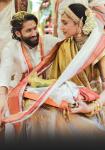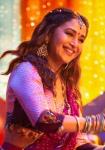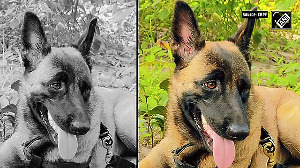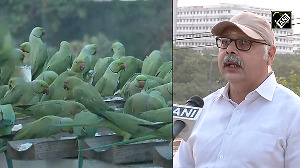Yalini, the daughter of Sri Lankan immigrants who left their war-torn country and married in America, is caught between the history of her ancestors and her own little world. As she looks after Kumaran in Toronto, she begins to see that the violence that has been consuming Sri Lanka for over two decades is very much a part of her present. Slowly, she traces her family's roots and the conflicts facing them through a series of marriages. Adding tension to her investigation is the impending politically motivated wedding in the family.
As the British newspaper The Independent pointed our recently, Michael Ondaatje visited Sri Lankan brutality in Anil's Ghost, a story about a forensic pathologist returning home to investigate abuses. Romesh Gunesekera dealt with its pain obliquely in Reef and The Sandglass. And Ganeshananthan focuses on the journey of one family, in the process painting a broader truth.
A 2002 graduate of Harvard College, Ganeshananthan, who was born and raised in America, received a Master of Fine Arts in fiction from the Iowa Writers' Workshop. In 2007, she graduated from the new master's programme at the Columbia Graduate School of Journalism. She has written and reported for The Atlantic Monthly, The Wall Street Journal, and The Chronicle of Higher Education. She is the vice president of the South Asian Journalists Association.
She spoke to rediff India Abroad Managing Editor (Features) Arthur J Pais.
What are some of the things that the world does not understand about the war in Sri Lanka?
I don't know if people understand how hard it is to have a conversation about Sri Lanka, which has a complicated population and history. If you don't acknowledge those nuances, the conversation isn't inclusive and can't move forward.
What are some of the most important things you are conveying through this novel?
I intended to write about the love of families, morality, and how war affects civil life. We reduce things: Arranged marriage versus love marriage, good versus evil. Very little actually works that way.
What kind of stories about the Sri Lankan civil war did you grow up listening to?
It's hard to remember. The war technically started after my parents were in the United States, so I suspect that a lot of what I originally heard was from the news. It wasn't something relatives would have offered to me directly -- I was young. Of course, I heard people's various stories of immigration after 1983, and eventually I was able to put those into context.
You wrote the novel over a period of several years. How did it change from the first draft to the last?
The version I turned in as my Harvard thesis was missing a character, Kumaran. He showed up the year after I graduated. The book became more political as the world did.
To what extent did your perspective change following the research?
I became more aware of the complexity of Sri Lanka's population, history and politics. The standard line about Sri Lanka says simply that the Tamil Tigers are fighting the Sinhalese-dominated government. But that leaves out the histories of both groups -- not to mention the other people who are involved, including civilians. In recent years, I have read a lot about Tamil civilians, journalists and aid workers disappearing. Investigations of these disappearances are never concluded. The people who are left live with a high degree of uncertainty. What could happen to them? Who would be responsible? How is this happening in areas under government control? The Tigers and the Sri Lankan government have both been criticised for human rights violations.
I also began to learn how the war had affected other minority populations. For example, in 1990, the Tigers expelled some Muslims in the northern areas from their homes. That displaced group has suffered tremendously. And I started to understand more about upcountry Tamils, whom the British brought from India to work on tea plantations. This population's history is different from that of the Tamils who were there before them. I also learned more about how caste functions in Sri Lanka. It's different than it is in India. I'm still studying all these things now. Not all of them ended up in the book, but it's important for me to know.
How did you research Love Marriage?
I went to and read about Sri Lanka; I interviewed people. I took a Tamil class and a South Asian anthropology class. I asked different people, including academics, to read parts of the book to check its plausibility. I took creative writing classes at every possible opportunity; I worked as a journalist. All these things ended up influencing the book, directly or indirectly.
How often many times have you visited Sri Lanka as an adult and what role did those visits play in the writing of this novel?
I have visited Sri Lanka twice as an adult. In 2003, a year before the tsunami, I went with my cousin and her friends. Some of them were Sinhalese and spoke that language. They were generous travel companions. We went to some of Sri Lanka's most famous sites: Anuradhapura, Sigiriya, the Temple of the Tooth, the Galle Face... It was an extraordinary trip. We went to Kandy and Galle and Bentota, and everything was beautiful. At the time, I was a student at the Iowa Writers Workshop.
My father accompanied me on the second trip, after I graduated from the workshop, and we went to Jaffna. I did research at the Jaffna Public Library and also interviewed people. Everyone was very kind, and my father was the best guide. It was remarkable to see places after reading about them.
When I do research, I rarely have a specific question. I'm trying to absorb everything that interests me. It's hard for me to pin down how these visits helped me to write Love Marriage. Still, they clearly did. They also got me started on the research for book two.
How difficult was it to you emotionally to write this book?
Some of my interviewees talked about times that had been difficult for them. I wanted to honour that, so I tried to listen. A lot of the research I did was unpleasant. But people went through horrible experiences, which clearly is harder than reading or writing about them.
Was Love Marriage the original title? Or did you have to work hard on deciding on this title?
This has always been the title.
What is the significance of the title?
The book is about marriages and families, but it's also a metaphor. Love Marriage implies choice. You are free to choose, and responsible for what you choose. But a love marriage can also take many different forms. And that's laid out on the very first page: You can choose, but there's a lot of gray.
Your characters undergo intense conflicts. Who do you think is the most conflicted character in the book? And why?
Probably Kumaran and Yalini. Yalini has to ask herself what it means for her family to have gone through what it's gone through, and for her uncle to have done what he has done. All this love and all these disagreements and different choices co-exist. She has to determine where she fits.
Kumaran's quandaries are different: Does he regret what he's done? What does his arrival mean for his family? How can he shape his daughter's fate? What kind of person is he going to be publicly? Privately?
One decides how she is going to live, and the other decides how he is going to die.
What reactions have you gotten from Tamil communities?
There's a range of opinions and feelings. In almost any situation, that is the case. That said, of course some people see references to things that have been relevant to them. The 1983 riots, for example, or stories of immigration, or places in Toronto.
And the Sinhalese readers?
Sinhalese readers, like Tamil readers, have a range of responses.
When did you first want to become a writer?
I have wanted to be a writer for as long as I can remember, because I love to read.
Who are some of the people who encouraged you the most, and how?
My parents always told me that I could do whatever I wanted in terms of a career. My mother encouraged me to read and told me I should try journalism. My father traveled to Sri Lanka with me and helped me to do research. Both my parents read the book to check the parts set in Sri Lanka. My brother and sister-in-law are also very supportive. They encourage me in my work and also make sure I take breaks from it!
My friends have cheered me on at every step. Some of them study Sri Lanka and helped me with research; some gave me feedback on the writing. One actually edited the book for Random House. My editor is an old, old friend of mine. We met on our first day of kindergarten. She has always supported my writing, and we have always discussed books. I feel very lucky that she ended up getting the book.
How does your background as a journalist aid your research?
Journalism helped me to find the right reading and to ask -- hopefully -- the right questions. And to be unafraid to ask! In the worst case scenario, someone doesn't want to talk or doesn't know the answer. Then you're no worse off than if you had never asked in the first place.
You studied creative writing at a number of levels. Do you think writing can be taught?
Some things about writing can definitely be taught. I've had some wonderful teachers. But also you can create a supportive environment for writers, and give them room and time to work. In Iowa I joined a community that discussed writing. That was very valuable. In fact, my first class there commented on this book.
Who are some of your favorite writers?
I have always loved Michael Ondaatje and Shyam Selvadurai. I repeatedly read Funny Boy and The English Patient. I also read other Sri Lankans: Romesh Gunasekara, Mary Anne Mohanraj, A Sivanandan. I also especially like (Gabriel) Garcia Márquez, James McPherson, Marilynne Robinson, Elizabeth McCracken, and (William) Faulkner. Of course, I have been fortunate to have a few of these writers as teachers. I have probably been most influenced by Jamaica Kincaid, who supervised Love Marriage when it was my thesis at Harvard. Her writing and method are very exact, and she's a great teacher.
What advice would you give a young writer?
Part of it is about building good habits. Just as you would practice anything else, you practice writing.
What is your next book and what themes would it cover?
The next book is set in Sri Lanka awhile ago and does not jump around in time as much. I can't say much more. I've learned that if you talk about a novel in its early stages an uncle might show up and throw everything for a loop!
Photograph: Preston Merchant






